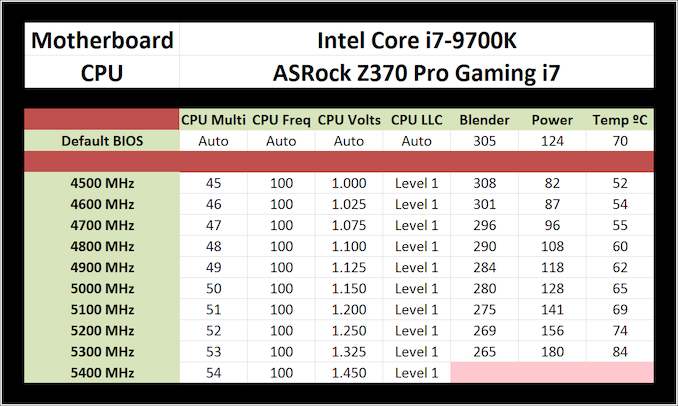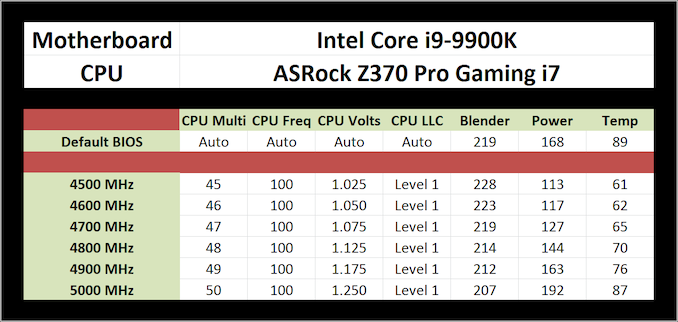The Intel 9th Gen Review: Core i9-9900K, Core i7-9700K and Core i5-9600K Tested
by Ian Cutress on October 19, 2018 9:00 AM EST- Posted in
- CPUs
- Intel
- Coffee Lake
- 14++
- Core 9th Gen
- Core-S
- i9-9900K
- i7-9700K
- i5-9600K
Overclocking
With the upgraded thermal interface between the processor and the heatspreader, from paste to solder, Intel is leaning on the fact that these overclockable processors should be more overclockable than previous generations. We’ve only had time to test the Core i9-9900K and i7-9700K on this, so we took them for a spin.
Our overclocking methodology is simple. We set the Load Line Calibration to static (or level 1 for this ASRock Z370 motherboard), set the frequency to 4.5 GHz, the voltage to 1.000 volts, and run our tests. If successfully stable, we record the power and performance, and then increase the CPU multiplier. If the system fails, we increase the voltage by +0.025 volts. The overclocking ends when the temperatures get too high (85C+).
For our new test suite comes new overclocking features. As mentioned in the previous page, our software loading for power measurement is POV-Ray, which can thrash a processor quite harshly. POV-Ray also does a good job on stability, but is not a substantial enough test – for that we use our Blender workload, which pushes the cores and the memory, and lasts about 5 minutes on an 8 core processor.
Results as follows:
For the Core i7-9700K, we hit 5.3 GHz very easily, for a small bump in power and temperature. For 5.4 GHz, we could boot into the operating system but it was in no way stable – we were ultimately voltage/temperature limited at this case. But an eight core, eight thread 5.3 GHz CPU at 180W for $374? Almost unimaginable a year ago.
Overclocking the Core i9-9900K was not as fruitful. The best bit about this overclock is the 4.7 GHz value: by using our own voltage settings, we reduced power consumption by 41W, almost 25% of the total power, and also reduced temperatures by 24ºC. That's a safe idea. Even 4.8 GHz and 4.9 GHz was reasonable, but the temperatures at 5.0 GHz might not be for everyone. When all cores and threads are loaded, this is one warm chip.












274 Comments
View All Comments
SanX - Thursday, October 25, 2018 - link
How come i7-7800x outperforms i9-9900 by the killing factor of 3-4 in particle movement? Is it not as "hand tunable" as older gen chips?davidk3501 - Thursday, October 25, 2018 - link
This is an overclockable processor, allowing users to push the frequency if the cooling is sufficient, and despite the memory controller still rated at DDR4-2666, higher speed memory should work in almost every chip. The Core i9-9900K also gets a fully-enabled cache, with 2 MB available per core for a chip-wide total of 16 MBashlord - Thursday, October 25, 2018 - link
My son's 4690K just blew up at such a shitty time. 8th gen 8400 is a decent replacement but 9th gen is out, so I don't really want to buy a previous gen item. I am guessing the '9400' will be out in a month or two. Going the AMD route has its issues too. It seems that AMD processors still have some issues with virtual appliances built using an older kernel. And in the past 30 years of computer ownership, I have never upgraded the processor. Components like motherboard or ram usually fail way before the CPU goes poof.In my country, R5 2600 w/Gigabyte Aorus B450M, 16GB of TridentZ RGB and a Cryorig M9+ goes for S$751. 8400 with MSI H310M Pro-M2, G.Skill Ripjaws V2400 and the same cooler goes for S$710.
ARgh!!! Don't know what to choose! Or maybe I should just give him my 6700K and get myself a new shiny toy.
nukunukoo - Friday, October 26, 2018 - link
I'm glad competition from AMD is back. Just a little over three years ago, an 8-core Intel would be a Xeon costing an arm and a leg!Dragonrider - Monday, October 29, 2018 - link
Just a note re the IGP. If you are going to try to watch 4k Blu-ray on your computer, you NEED that Intel IGP. I don't think there is any other solution to the DRM. For some, that alone would be a reason to get the Intel processor, all else being in the same ballpark.y2k1 - Wednesday, October 31, 2018 - link
What about performance pet watt? Is it basically the same as last gen?hanselltc - Thursday, November 1, 2018 - link
wat bout 9700k vs 9900k in gaming thoAlways_winter - Wednesday, November 28, 2018 - link
what cpu cooler did you usepoohbear - Monday, December 10, 2018 - link
Wow that 10nm CPU is taking forever eh? AMD is to release 7nm CPUs next month, and intel can't produce 10nm in 2019? What happened exactly?ROGnation7 - Saturday, February 23, 2019 - link
Watching all these benchmarks nowadays and taking count on how well optimised games are these days , at last the AAA titles , makes you think if it even worth it to spend more than 300-350 bucks on CPUs for gaming . Just look at i5-9600k and r5 2600x going toe to toe with high end CPUs with a decent graphics card.